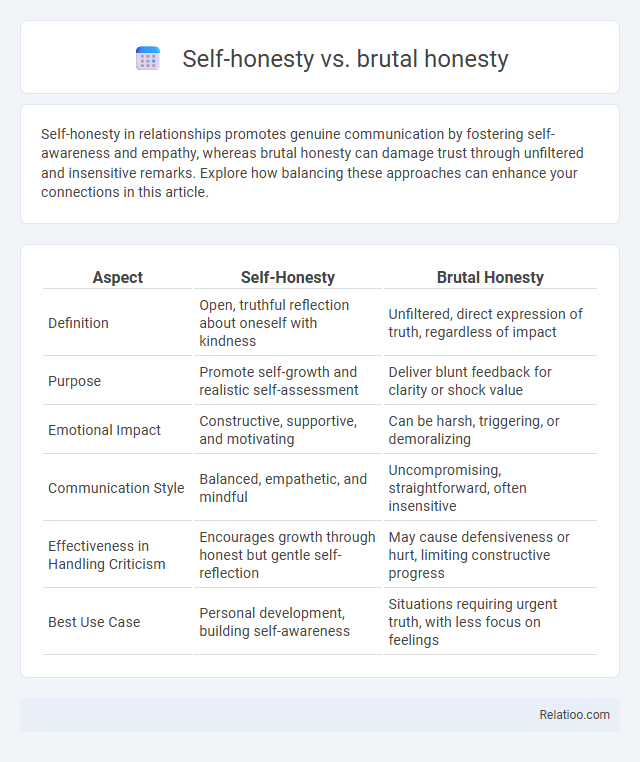Self-honesty in relationships promotes genuine communication by fostering self-awareness and empathy, whereas brutal honesty can damage trust through unfiltered and insensitive remarks. Explore how balancing these approaches can enhance your connections in this article.
Table of Comparison
| Aspect | Self-Honesty | Brutal Honesty |
|---|---|---|
| Definition | Open, truthful reflection about oneself with kindness | Unfiltered, direct expression of truth, regardless of impact |
| Purpose | Promote self-growth and realistic self-assessment | Deliver blunt feedback for clarity or shock value |
| Emotional Impact | Constructive, supportive, and motivating | Can be harsh, triggering, or demoralizing |
| Communication Style | Balanced, empathetic, and mindful | Uncompromising, straightforward, often insensitive |
| Effectiveness in Handling Criticism | Encourages growth through honest but gentle self-reflection | May cause defensiveness or hurt, limiting constructive progress |
| Best Use Case | Personal development, building self-awareness | Situations requiring urgent truth, with less focus on feelings |
Understanding Self-Honesty: Facing Your Inner Truth
Understanding self-honesty requires you to confront your inner truth with courage and clarity, acknowledging your emotions and motivations without judgment. Unlike brutal honesty, which often disregards feelings and can harm relationships, self-honesty promotes personal growth and emotional balance through compassionate self-reflection. Embracing self-honesty enables deeper self-awareness and fosters authentic connections grounded in trust and integrity.
Defining Brutal Honesty: The Fine Line Between Truth and Harm
Brutal honesty involves expressing the unvarnished truth without regard for emotional impact, often leading to hurt feelings despite its intent to be transparent. Unlike self-honesty, which is a reflective and compassionate internal process fostering personal growth, brutal honesty externalizes raw truths that can damage relationships or trust. Maintaining a balance between raw truth and empathy is essential to avoid harm while upholding integrity in communication.
Psychological Benefits of Self-Honesty
Self-honesty fosters psychological well-being by promoting authentic self-awareness and reducing cognitive dissonance, which helps individuals align their values and actions more effectively. Unlike brutal honesty, which can lead to interpersonal conflict and anxiety, self-honesty supports emotional regulation and resilience by encouraging constructive self-reflection without harsh self-criticism. Embracing self-honesty enhances mental health by cultivating self-compassion, personal growth, and a deeper understanding of one's motivations and behaviors.
Consequences of Practicing Brutal Honesty
Practicing brutal honesty often leads to immediate emotional reactions and potential harm to relationships due to its unfiltered and harsh nature. Unlike self-honesty, which fosters personal growth through compassionate self-reflection, brutal honesty can cause defensiveness, resentment, and social isolation. Maintaining a balance between honest self-assessment and considerate communication is crucial to avoid the negative consequences associated with brutal honesty.
Self-Honesty vs Brutal Honesty: Key Differences
Self-honesty involves a compassionate and truthful assessment of one's own thoughts and actions, fostering personal growth and emotional well-being. Brutal honesty, by contrast, emphasizes delivering unfiltered truth, often disregarding the feelings of others and risking interpersonal conflict. The key difference lies in self-honesty's balance between truthfulness and kindness, while brutal honesty prioritizes raw truth without softenings.
When Self-Honesty Leads to Personal Growth
Self-honesty fosters personal growth by allowing you to objectively evaluate your thoughts and behaviors without harsh judgment, creating a foundation for meaningful change. Unlike brutal honesty, which can be damaging if delivered without empathy, self-honesty encourages compassionate self-awareness and accountability. Embracing self-honesty enables deeper reflection, leading to improved emotional resilience and healthier decision-making.
Social Impact of Brutal Honesty in Relationships
Brutal honesty in relationships often leads to social friction, as its unfiltered nature can cause emotional harm and reduce trust between individuals. Unlike self-honesty, which fosters personal growth through introspection, brutal honesty emphasizes blunt truth-telling that may disrupt social harmony. Prioritizing empathetic communication while maintaining self-honesty allows for healthier interactions and stronger relational bonds.
How to Cultivate Self-Honesty Without Self-Judgment
Cultivating self-honesty without self-judgment involves practicing mindful awareness of your thoughts and emotions, allowing you to observe them objectively without attaching negative labels. Emphasizing acceptance over criticism creates a safe internal environment where true self-reflection can occur, fostering personal growth and emotional resilience. Techniques such as journaling, meditation, and compassionate self-talk reinforce this balance, helping to differentiate between constructive honesty and destructive self-criticism.
Balancing Authenticity and Compassion in Communication
Balancing authenticity and compassion in communication requires distinguishing self-honesty, brutal honesty, and considerate expression; self-honesty involves recognizing one's feelings and motives with kindness, while brutal honesty often prioritizes blunt truth without regard for others' emotions. Effective communication blends transparent self-awareness with empathy, fostering trust and respect without causing unnecessary harm. Mastering this balance enhances interpersonal relationships and promotes emotional intelligence in both personal and professional settings.
Practical Tips for Choosing the Right Honest Approach
Choosing between self-honesty, brutal honesty, and other honest approaches depends on context, emotional impact, and communication goals. Practice self-honesty by regularly reflecting on personal values and feelings to maintain internal integrity without harsh self-judgment. Use brutal honesty selectively, ensuring it's constructive and empathetic to avoid damaging relationships while fostering trust and clarity.

Infographic: Self-honesty vs Brutal honesty
 relatioo.com
relatioo.com